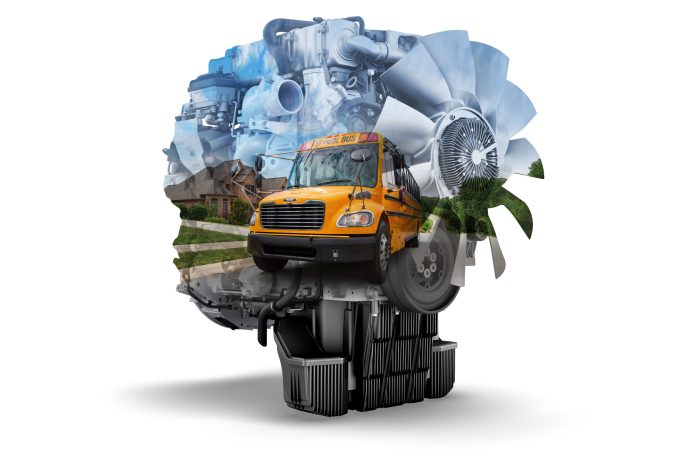New clean-diesel school buses equipped with Detroit® DD5™ and DD8™ engines have been hitting the roads these past few years, which means that we now have real-world data on how well they are performing.
From the beginning, it’s been clear that clean-diesel school bus engines are just as clean, if not cleaner than alternative fuel school buses when measured against EPA regulated emissions. That’s easy to measure and is evident in the CARB data being reported on these engines.
Yet, besides being clean, are they living up to all the hype? Based on data from millions of miles on the road, the evidence points to “yes.”
Fleets across the country are experiencing significant gains in fuel economy, lower maintenance needs and a reduction, and sometimes elimination of, regen issues.
“We are tracking the data of 6,500 Thomas Built Buses Saf-T-Liner® C2 school buses equipped with DD5 engines. So far 2,300 of those buses are showing maturity with at least 8,000 miles on them, so we have some really good data. And what we are seeing are reports of fuel economy as high as 9.4 miles per gallon. Plus, some of these buses have driven 50,000 miles or more and have never experienced a single parked regen,” said Jed Routh, vice president of sales, services and marketing for Thomas Built Buses. “The real-world data is exactly what we had anticipated, but at the same time, we are thrilled to see these data points coming in.”
Aftertreatment/Regen Issues a “Non-issue”
Likely one of the biggest causes to celebrate is the reduction in aftertreatment issues. After all, aftertreatment issues and parked or manual regens are one of the biggest concerns for transportation directors and technicians today. In older buses, manual regens are frequent, and maintenance costs can be high.
With newer clean-diesel school buses equipped with engines like Detroit or Cummins, most regens taking place are passive regens, which occur automatically without any other aids like fuel dosing. In the Detroit engines, the exhaust temperatures heat up to around 662 degrees Fahrenheit in order to burn all the soot off, and in Cummins engines, with the Stay Warm feature activated, the engines remain hot enough to continually burn soot, nearly eliminating the need for a parked regen.
In older buses, school bus engines didn’t get hot enough to regen on their own with their stop-and-go nature, so many fleets have experienced six or more parked regens a day. With a parked regen, these buses are parked and out of commission until the regen is complete, which can take around 30 minutes.
However, engines like the DD5 and DD8 are constructed using variable cam phasing, which keeps the aftertreatment system in an ideal state, even in stop-and-go operations.
This means that oftentimes no manual regens are required. To date, Detroit is leading the industry with this proprietary technology that improves the performance and efficiency of the aftertreatment system and provides industry-leading emissions reductions, increased torque and improved fuel economy all at the same time.
“The Detroit engines seem to be real game changers,” said Routh. “As I mentioned before, we are seeing buses, which have run tens of thousands of miles, and have yet to require a single parked regen. Overall, more than 70% of the buses that we are tracking have had two or fewer parked regens since they hit the road, which is ten times fewer regens than what is typically expected from an older diesel engine. With the Detroit engines, we are seeing that regens are pretty much a non-issue.”
Fuel Economy Benefits Fleets with Tightening Budgets
Aside from aftertreatment issues, fuel costs are of increasing concern to districts, especially as budgets continue to tighten. In fact, fuel costs represent more than two-thirds of the typical school bus fleet’s annual operating expense.
Diesel school buses are already the most fuel-efficient in the industry, due to a higher BTU count compared to other fuels, providing better fuel economy and a longer operating range compared to similar-sized gasoline, propane or compressed natural gas (CNG) engines. On average, a clean-diesel school bus can travel approximately 510 miles on a tank of diesel vs. only 270 miles on gasoline, based on the same standard-sized fuel tanks.
With the DD5 and DD8 diesel engines, it was estimated that districts would see an additional three percent increase in fuel efficiency versus older diesel engines. Based on real-world data, those estimates were conservative.
“On average, most fleets are getting around 9.45 miles per gallon, which is a one to three mile per gallon improvement over older diesel engines. This savings is particularly impactful when you look at special-needs buses that idle a lot. On special-needs buses, we are seeing around 8.3 miles per gallon in fuel economy, or a three mile per gallon improvement, when you consider idling,” said Routh. “In total, that’s 10–15 percent better fuel economy than older diesel engines and a 60–70 percent increase over propane or gasoline.”
Routh notes that at the end of the day, new clean-diesel engines provide fleets a high-quality product that requires lower maintenance and reduces a fleet’s total cost of ownership. And now with real-world data, customers in the market for a new diesel school bus know exactly what to expect in their own fleet.
Thomas Built Buses recently hosted a podcast on clean-diesel technology. You can listen in here to explore this topic and others. Or to learn more about new clean-diesel school buses, contact your local Thomas Built Buses dealer.
















